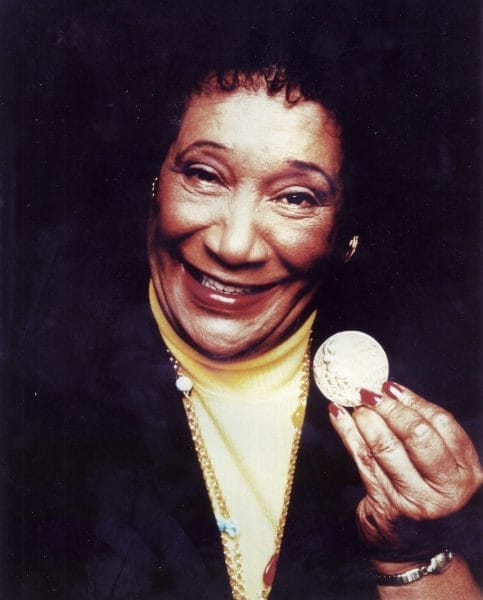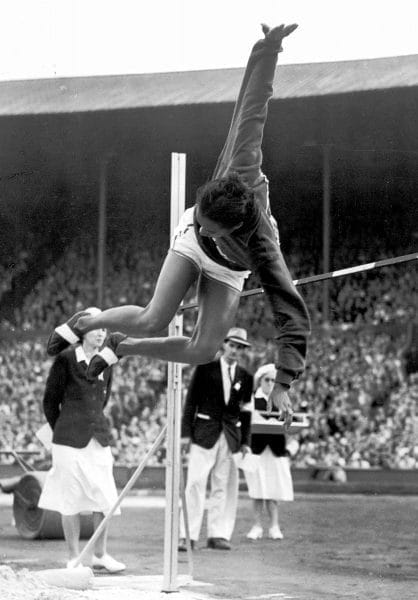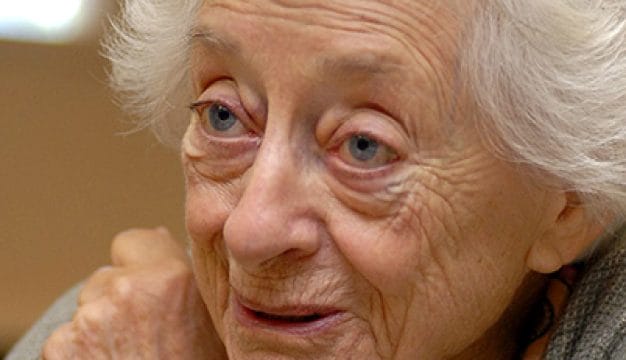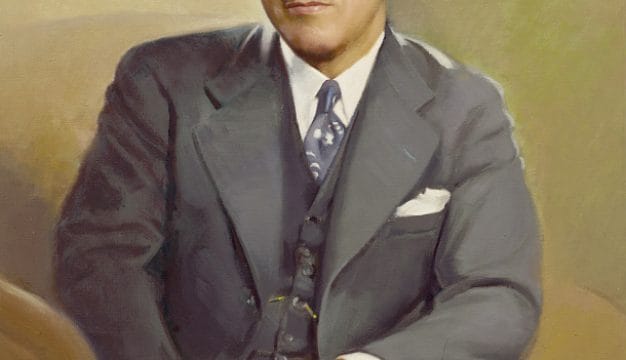Alice Coachman
Tuskegee Institute track star Alice Coachman (1923-2014) became the first black woman athlete of any nation to win an Olympic gold medal and also was among the first American women to win an Olympic medal in track and field. Raised in Albany, Georgia, Coachman moved to Tuskegee in Macon County at age 16, where she began her track and field success.
 Alice Coachman
The fifth of 10 children, Alice was born to Fred and Evelyn Coachman on November 9, 1923, in Albany, a predominantly black small town in southwest Georgia. Her father worked as a plasterer and her mother raised the children at home. As a child, Alice was a tomboy, but her father, influenced by society’s reluctance to accept female athletes and fearing for her safety as an African American in a segregated society, initially discouraged her from sports. Fortunately, Alice’s fifth grade teacher, Cora Bailey, and her aunt, Carrie Spry, encouraged her sports interest and worked on allaying her parents’ reservations. Because of a lack of integrated training facilities, Alice ran and later trained on the dirt roads and up and down hills around Albany, mostly barefooted, developing strength and stamina.
Alice Coachman
The fifth of 10 children, Alice was born to Fred and Evelyn Coachman on November 9, 1923, in Albany, a predominantly black small town in southwest Georgia. Her father worked as a plasterer and her mother raised the children at home. As a child, Alice was a tomboy, but her father, influenced by society’s reluctance to accept female athletes and fearing for her safety as an African American in a segregated society, initially discouraged her from sports. Fortunately, Alice’s fifth grade teacher, Cora Bailey, and her aunt, Carrie Spry, encouraged her sports interest and worked on allaying her parents’ reservations. Because of a lack of integrated training facilities, Alice ran and later trained on the dirt roads and up and down hills around Albany, mostly barefooted, developing strength and stamina.
Coachman entered Madison High School in Albany in 1938 and joined the track team, soon attracting a great deal of local attention. At age 16, she enrolled in the high school program at Tuskegee Institute. Even before classes began, Coachman won her first national championship in the high jump at the Amateur Athletic Union event in 1943. At Tuskegee Institute High School, at Tuskegee Institute itself, and in wider competition, Coachman won 10 straight championships in the high jump between 1939 and 1948, as well as 25 indoor and outdoor 50- and 100-meter championships. She was a mainstay on Tuskegee’s powerful track squad, which won 11 of 12 AAU championships between 1937 and 1948 under legendary coach Cleve Abbott. Coachman also played on the school’s basketball team and was adept in the classroom, graduating from Tuskegee in 1946 with a degree in dressmaking. In 1949, she received a bachelor’s degree in home economics from Albany State College.
 Alice Coachman High Jump
During Coachman’s prime athletic years, the 1940 and 1944 Olympic Games were cancelled because of World War II. In 1948, however, she finally had her chance at the 14th modern Olympics, which were held in London that year. Despite being past her prime at age 25 and suffering from back troubles, Coachman set an Olympic record before 83,000 people in the high jump with a leap of 5 feet, 6-1/8 inches—a feat that stood for eight years. Upon returning to the United States, Coachman and several other black Olympians met with Pres. Harry Truman at the White House. But like many of the black soldiers returning from World War II, when Coachman returned to her hometown she was subject to the racially discriminatory Jim Crow laws still in effect in the South.
Alice Coachman High Jump
During Coachman’s prime athletic years, the 1940 and 1944 Olympic Games were cancelled because of World War II. In 1948, however, she finally had her chance at the 14th modern Olympics, which were held in London that year. Despite being past her prime at age 25 and suffering from back troubles, Coachman set an Olympic record before 83,000 people in the high jump with a leap of 5 feet, 6-1/8 inches—a feat that stood for eight years. Upon returning to the United States, Coachman and several other black Olympians met with Pres. Harry Truman at the White House. But like many of the black soldiers returning from World War II, when Coachman returned to her hometown she was subject to the racially discriminatory Jim Crow laws still in effect in the South.
Coachman returned to her Georgia home by way of Atlanta, and crowds gathered in small towns and communities along the roadways to see her. She was the guest of honor at a party thrown by famed jazz musician William “Count” Basie. But when she attended a celebration at the Albany Municipal Auditorium, she entered a stage divided by race—whites on one side, blacks on the other. Coachman realized that nothing had changed despite her athletic success; she never again competed in track events. She married N. F. Davis, had two children, and strove to become a role model away from the athletic limelight.
In 1952, she became the first African American woman to sponsor a national product, after signing an endorsement deal with Coca Cola. Coachman’s post-Olympic life centered on teaching elementary and high school, coaching, and working briefly in the Job Corps. She also taught physical education at South Carolina State College, Albany State College, and Tuskegee High School. Coachman retired from teaching in 1987, and Davis died in 1992.
 Gold Medal Winner Alice Coachman
Coachman remained in relative obscurity until the 1996 Atlanta Olympics. Newspapers recalled her 1948 record, interviewed her, and recognized her pioneering role for black women in track. Coachman was included in an Avon-sponsored exhibit entitled “The Olympic Woman” at New York’s Olympic Arts Festival, interviewed for television, feted at a luncheon, and spoke to school students in Manhattan. She was one of 12 torchbearers for the Atlanta games and was honored at the Olympic ceremony as one of the 100 greatest Olympians.
Gold Medal Winner Alice Coachman
Coachman remained in relative obscurity until the 1996 Atlanta Olympics. Newspapers recalled her 1948 record, interviewed her, and recognized her pioneering role for black women in track. Coachman was included in an Avon-sponsored exhibit entitled “The Olympic Woman” at New York’s Olympic Arts Festival, interviewed for television, feted at a luncheon, and spoke to school students in Manhattan. She was one of 12 torchbearers for the Atlanta games and was honored at the Olympic ceremony as one of the 100 greatest Olympians.
In 1994, Coachman founded the Alice Coachman Track and Field Foundation in Akron, Ohio; her son Richmond Davis operates the nonprofit organization designed to assist young athletes and help Olympians adjust to life after retirement from competition. Coachman was inducted into the Alabama Sports Hall of Fame in 1997 and recognized on the floor of the Alabama House of Representatives in 2002 for her achievements. In 2004, she was named to the Olympic Hall of Fame; she would be inducted to nine halls of fame in total. Coachman died on July 14, 2014, in Albany, Georgia.
Further Reading
- Pratt, Ted. “Ahead of the World, Ahead of Her Time Before the day of Endorsements, Gold-Medal Winner Alice Coachman Found Her Reward in Teaching.” Birmingham News, November 26, 1995.
- Rhoden, William. “Good Things Happening for One Who Decided to Wait.” New York Times, April 27, 1995.
- Roulhac, Nellie Gordon. Jumping Over the Moon: A Biography of Alice Coachman Davis. Philadelphia: Privately printed, 1993.



